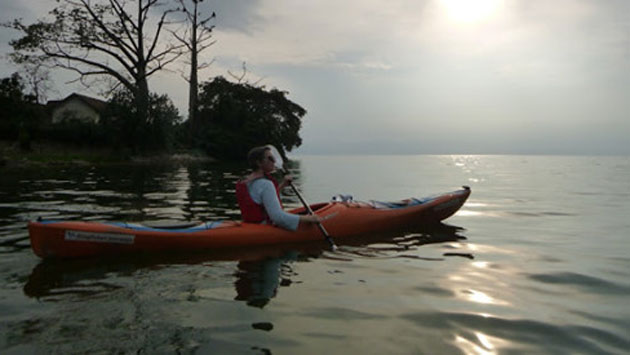Rwanda is a country of hills and rivers, making it a hidden gem for waterfalls.…

Eco-Friendly Tourism in Rwanda
Rwanda, renowned for its stunning landscapes and rich biodiversity, is also a pioneer in sustainable tourism. With its commitment to conservation and community development, the country offers eco-friendly tourism with Rwanda that allow travelers to experience its natural beauty while minimizing their environmental impact. If you’re passionate about responsible tourism, Rwanda provides numerous opportunities to explore its wonders in a way that respects and preserves its unique ecosystems. Here’s how you can embark on eco-friendly tourism in Rwanda and contribute to responsible tourism.
1. Gorilla Trekking with Conservation Focus
Gorilla trekking in Volcanoes National Park is one of the most sought-after experiences in Rwanda, and it’s also at the forefront of eco-friendly tourism efforts.
Highlights:
- Permits and Conservation: Trekking permits are priced to fund gorilla conservation and community projects. Each permit supports anti-poaching initiatives and habitat preservation.
- Guided Treks: Experienced guides ensure that interactions with gorillas are respectful and minimally invasive, promoting the well-being of these endangered animals.
- Sustainable Practices: The park employs sustainable practices such as waste management and habitat restoration to protect the gorillas’ natural environment.
2. Community-Based Tourism
Community-based tourism initiatives in Rwanda empower local communities and promote environmental stewardship. Engaging with these initiatives provides travelers with authentic experiences while supporting local development.
Highlights:
- Cultural Tours: Participate in tours organized by local communities, such as those in Nyamirambo, where you can learn about traditional crafts, cuisine, and daily life.
- Eco-Lodges: Stay in eco-lodges or community-run accommodations that prioritize sustainability, use renewable energy, and minimize waste.
- Conservation Projects: Support projects that focus on reforestation, wildlife protection, and sustainable agriculture, contributing directly to local conservation efforts.
3. Sustainable Safari Experiences in Akagera National Park
Akagera National Park offers a classic safari experience with a strong focus on sustainable practices. The park’s efforts ensure that wildlife conservation and eco-friendly tourism go hand in hand.
Highlights:
- Eco-Friendly Accommodations: Choose from eco-lodges and camps that use solar power, recycle waste, and follow sustainable practices.
- Wildlife Conservation: Revenue from tourism helps fund anti-poaching units, habitat restoration, and wildlife monitoring programs.
- Responsible Safaris: Guides are trained in responsible wildlife viewing practices, ensuring that your safari experience has minimal impact on the animals and their habitats.
4. Eco-Trekking in Nyungwe Forest National Park
Nyungwe Forest, one of Africa’s oldest rainforests, is a hotspot for eco-friendly adventures. The park offers a range of activities that emphasize conservation and sustainability.
Highlights:
- Canopy Walkway: Experience the forest from above on the canopy walkway, which provides a unique perspective while minimizing disturbance to the ecosystem.
- Primate Tracking: Participate in chimpanzee and colobus monkey tracking with guides trained in eco-friendly practices to ensure minimal impact on wildlife.
- Eco-Lodges: Stay at lodges that incorporate sustainable practices such as water conservation, waste management, and support for local communities.
5. Birdwatching and Eco-Tours Around Lake Kivu
Lake Kivu and its surrounding areas are ideal for eco-friendly tourism, offering opportunities for birdwatching, kayaking, and exploring local culture.
Highlights:
- Birdwatching: Explore the lake’s diverse habitats to spot a variety of bird species, including rare and endemic ones, while respecting their natural environment.
- Kayaking and Canoeing: Enjoy water-based activities that have minimal environmental impact, and support local guides who practice sustainable tourism.
- Community Engagement: Visit local villages to learn about traditional fishing practices and sustainable livelihoods, fostering cultural exchange and environmental awareness.
6. Responsible Travel Tips for Rwanda
To fully embrace eco-friendly adventures and responsible tourism in Rwanda, consider the following tips:
- Support Local Conservation Efforts: Choose activities and accommodations that contribute to conservation projects and support local communities.
- Minimize Waste: Carry reusable water bottles, avoid single-use plastics, and adhere to waste disposal guidelines in protected areas.
- Respect Wildlife: Maintain a safe distance from animals, avoid feeding them, and follow guidelines provided by park rangers and guides.
- Stay Informed: Educate yourself about the local environment, conservation issues, and cultural practices to enhance your travel experience and contribute positively.
Conclusion: Embrace Eco-Friendly Adventures in Rwanda
Rwanda’s commitment to conservation and sustainable tourism makes it an exceptional destination for eco-friendly adventures. By choosing responsible travel practices and supporting local conservation efforts, you can explore the country’s natural beauty and wildlife while contributing to its preservation. Rwanda’s eco-friendly initiatives provide a model for sustainable tourism, offering travelers the chance to enjoy unforgettable experiences while making a positive impact on the environment and local communities.



